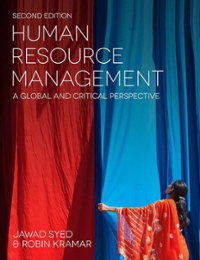Question
As you discussed, surveys are a commonly used research method that have many benefits, including the ability to collect data from a large number of
As you discussed, surveys are a commonly used research method that have many benefits, including the ability to collect data from a large number of individuals (which increases generalizability), cost-effectiveness, convenience, flexibility (they can be designed to measure a wide range of variables), and quick data collection. However, these methods are not without drawbacks. You mentioned that you might not always get the correct answer from participants. Why do you think this is the case? What would make this method more vulnerable to response bias, compared to other methods? As a researcher, what are some ways you could help to guard against the potential for bias?
Step by Step Solution
There are 3 Steps involved in it
Step: 1

Get Instant Access to Expert-Tailored Solutions
See step-by-step solutions with expert insights and AI powered tools for academic success
Step: 2

Step: 3

Ace Your Homework with AI
Get the answers you need in no time with our AI-driven, step-by-step assistance
Get Started


